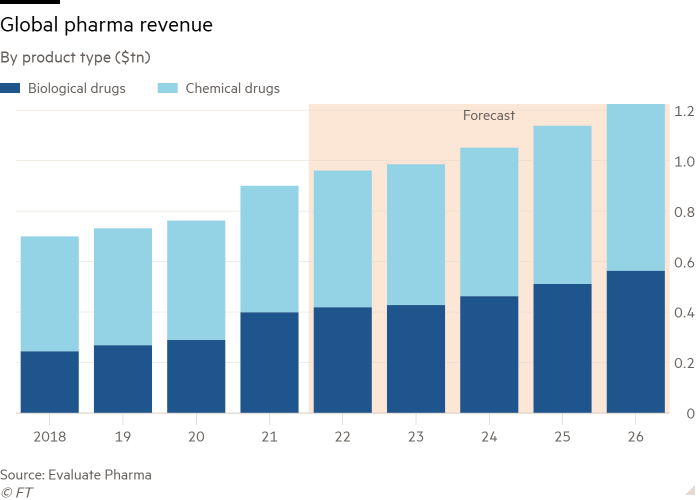Samsung Biologics capitalises on pandemic boom to expand in US and Europe
Samsung Biologics, the biopharmaceutical unit of South Korea’s Samsung Group, is seeking to build its first plants in the US and Europe as it rebalances its global supply chains following the pandemic.
The world’s largest contract drugmaker, which produces for other global pharmaceutical companies, is cash-rich two years into the pandemic, posting a 35 per cent jump in 2021 revenue. Its manufacturing order backlogs are up 25 per cent to $7.5bn on surging demand for coronavirus treatments offered by US drugmaker Eli Lilly and the UK’s GSK and AstraZeneca.
John Rim, the company’s chief executive, told the Financial Times that the company seeks to build overseas plants to be closer to its main customers and meet surging demand for contract manufacturing.
“The Covid situation has highlighted more of the need to diversify and risk manage, particularly around supply chain management. It has also highlighted the need for doing things quick,” said Rim, who has been head of the company since December 2020.
He said demand for Covid antibody treatments were exceeding supply because of growing orders from US customers, though demand for Covid vaccines decreased recently because of the Omicron variant. The company added that it has not yet experienced any significant supply disruption as a result of the war in Ukraine.
The company signed a “fill and finish” deal with Moderna last May and began producing vials of Moderna’s mRNA vaccines in September. From April, it will also start producing GreenLight Bioscience’s mRNA vaccine candidate, which is in third-stage clinical trials.
The pandemic has helped the company rapidly expand its product portfolio. It has diversified from its focus on monoclonal antibodies — molecules engineered to fight cancer and autoimmune diseases — to offer products including cell and gene therapies and next-generation vaccines using mRNA, pitting it against its Swiss rival Lonza Group and Germany’s Boehringer Ingelheim.

Rim said biosimilars, which are lower priced than branded products, are making faster penetration in Europe than in the US, citing more complicated patent and pricing issues in the US.
“But the US will start to pick up as well because all the health systems globally are under more pressure to reduce expenses and make [treatments] more available to patients,” he said.
Samsung Biologics expects to double its market share for large-scale monochrome antibody production to 40 per cent next year once its $1.4bn fourth plant in Songdo comes online in October.
Global sales of biological medicines are estimated at $419bn this year, still smaller than their chemical counterparts at $542bn, but the market is forecast to grow 35 per cent to $564bn by 2026, according to research firm Evaluate Pharma.
But contract manufacturing of biological drugs requires heavier investments and a demanding production process that Lin said was similar to semiconductors because it should not be contaminated by bacteria.
Samsung Biologics has also been on the acquisition hunt. It recently agreed to buy Biogen’s 49.9 per cent stake in their joint venture Bioepis for $2.3bn to reinforce its biosimilar business, which is seen as a stepping stone to its long-term goal of making its own new drugs.
For all the latest Business News Click Here
For the latest news and updates, follow us on Google News.
